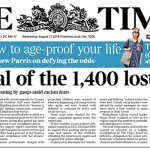In a Letter to the Editor, Richard INESON – one of North Yorkshire’s foremost observers and critics of Council and Police performance, has asked us to share with readers hiis email to North Yorkshire Police & Crime Commissioner JULIA MULLIGAN (Conservative).
~~~~~
From: Richard Ineson [redacted] Sent: 26 February 2015 13:42
To: Julia Mulligan (pcc@northyorkshire-pcc.gov.uk)
Subject:http://www.yorkshirepost.co.uk/news/main-topics/general-news/north-yorkshire-police-chief-takes-trio-to-court-over-campaign-of-personal-harassment-1-7116432Dear Julia,
I write to you, in connection with the above article published by the Yorkshire Post on the 20th February, 2015.
I must say that I was very disappointed to learn about the, to my mind, misguided decision, to take legal action against Nigel Ward, and Tim Hicks in relation to their efforts to expose Saville and Jaconelli as sexual predators, and cannot understand how the Police Authority are able to fund a legal action on behalf of eight seemingly, private, and anonymous individuals, especially to the tune of £400,000 and rising.
I understand that there are nine people, including the Chief Constable Dave Jones, who are seeking an injunction, against Nigel Ward and Tim Hicks (I know that Peter Hofshroer is also involved, but I am not aware of his role, if any, in the rightful exposure of Saville and Jaconelli, and the failure of the authorities to take action against these two sexual predators) can you tell me who the other eight people are please?
When you were standing for election as the Police and Crime Commissioner for North Yorkshire, I came to hear you speak at the Scarborough library, on that occasion, I drew your attention to the appalling management of North Yorkshire Police over many years, whilst Cllr. Jane Kenyon (now Kenyon Miller) was the Chair of the North Yorkshire Police Authority and also the Chair of the North Yorkshire Management Board, I highlighted some instance of this mismanagement, both of personnel, and finance, which came to my attention via the newspapers during this time, which I posted on the Real Whitby website in 2012, and which I copy, for your information, below :-
The North Yorkshire Police Authority (NYPA) is soon to be abolished; during recent years we have seen mismanagement of public money by this body and dishonourable conduct from senior police officers.
The people of North Yorkshire have undoubtedly been badly served by both the members of the North Yorkshire Police Authority, the members of which are: –
- Chair: Cllr. Jane Kenyon,
- Bill Baugh,
- Carl Les,
- Tony Hargreaves J.P.,
- Keith Orrell,
- Helen Swiers,
- Polly English,
- Fiona Fitzpatrick,
- David Ireton,
- Janet Jefferson,
- Brian Marshall,
- Jason Fitzgerald-Smith,
- Erica Taylor J.P.,
- Rajinda Richards,
- Craig Shaw,
- Ian Whittaker J.P.
and also the North Yorkshire Police Authority Management Board, the members of which are:-
- Chair Cllr. Jane Kenyon,
- Vice Chair Mr. Bill Baugh,
- Tony Hargreaves J.P,
- Carl Les,
- Keith Orrell.
The Management Board has delegated powers to enable it to ensure, that amongst many other things, the Authority (NYPA) operates in an open and transparent manner.
The Authority (NYPA) has a high profile and standing. It monitors expenditure, (which presumably includes salaries and allowances paid to the employees of the Authority, including its Chief Officers) against the Authority’s budget.
The actions of the NYPA have been criticised by the Independent Police Complaints Commission, who said that:
“the Authority’s lack of control was unacceptable”
and also by Hugh Bayley M.P., former M.P Phil Willis and Julian Smith M.P.
But strangely, only eight out of seventy two Councillors supported a motion criticising Grahame Maxwell for wasting tax payers’ money.
The most notable/outrageous/scandalous/disgraceful events in the recent past, which I can recall are:-
The squandering of £500,000 on providing Volvo V70 and Range Rover vehicles for senior police officers who were not qualified to drive these vehicles on police business.The £28,400 shower installed in the office of then Chief Constable Della Canning.
Then there is the matter of Peta Ackerley the wife of former Police Superintendent (in charge of NYPA police force training) who received £400,000 from the force in payments to her training companies, companies which, according to an audit report, ‘often got work without going through proper procurement procedures’.
Superintendent Ackerley escaped disciplinary action after his application to retire , after thirty years service, was accepted by Chief Constable Grahame Maxwell; on this point, officers have the right to retire after thirty years, but where disciplinary charges are outstanding this right can be waived until the charges have been heard, in this case this was not done.
Phil Willis, M.P. for Harrogate and Knaresborough at the time, said,
“Hopefully, this brings to an end a period when NY Police had a cavalier attitude to accountability for public money”.
High hopes indeed.
Then there are the circumstances surrounding the early retirement of Assistant Chief Constable, David Collins in July 2009, who earned a £100,000 salary, and who took sick leave in November 2008, claiming stress, and was still off work in June 2009, on half his salary.
On 4th June, he attended a University of York conference and handed out flyers to delegates to promote his life coaching consultancy service.
But, unfortunately for Mr Collins, one of the conference delegates was his former boss, North Yorkshire’s ex-Chief Constable Della Cannings, who promptly reported him to North Yorkshire Police Authority.
They investigated and discovered Mr Collins was also offering mentoring services via the internet.
The 49-year-old was allowed to back up his business qualifications with training while he worked as a policeman, but he did not have permission to seek customers for his business.
Shortly after being discovered by Ms Cannings, Mr Collins went on holiday. When he returned he discovered that the police authority wanted to relieve him of his post.
Instead Mr Collins, of Monk Fryston near Selby, successfully applied for retirement. Because of this, he will still receive a six-figure sum for his 30 years of service.
Jeremy Holderness, the chief executive of North Yorkshire Police Authority, said:
“Although the authority considered all options with regard to the conduct of Mr Collins in the circumstances, it was not possible to instigate formal disciplinary action against him as he was no longer a serving police officer.”
There are other considerations here of course – if Mr. Collins was too sick to work, he was presumably claiming sickness/incapacity benefit, under the terms of which, the claimant is not allowed to do any work of any kind, perhaps the Dept. of Work and Pensions might have an interest in reclaiming any benefits which might have been paid in this case.
The nepotism cases which resulted in the resignation/early retirement of Adam Briggs and Graham Maxwell.
It has previously been revealed that the Independent Police Complaints Commission spent £100,000 investigating claims that Mr Maxwell and his deputy, Adam Briggs, unfairly helped relatives during a recruitment exercise for new police officers last year.
Two counts of misconduct were upheld against Mr Briggs in December and he retired from the force earlier this year.But the main focus of the investigation and subsequent disciplinary action was Mr Maxwell, with tens of thousands of pounds mounting up in legal costs after the Chief Constable initially challenged the charge of gross misconduct.
He only admitted the charge last month and was given a final written warning.
The full police authority costs for bringing the cases against Mr Maxwell and Mr Briggs were £218,456. Around £19,000 was spent on inquiries involving both officers – but the bulk was spent solely on the Chief Constable’s case.
If Mr Maxwell had admitted gross misconduct last October, most of the £200,000 costs could have been avoided. It is understood it may still have cost around £20,000 to carry out the formalities of a hearing.
Skipton and Ripon Tory MP Julian Smith, who previously described Mr Maxwell’s position as “untenable”, said:
“Taken with the one hundred thousand pounds spent by the Independent Police Complaints Commission, the amount of money this investigation has cost so far is over a quarter of a million pounds.
In addition, this is not necessarily the end of the money spent as these figures do not include any money spent by the force itself.
Had the Chief Constable admitted his guilt late last year, instead of at the very last minute, hundreds of thousands of pounds of taxpayers’ money could have been saved on legal costs.
It is deeply regrettable that during challenging financial times, the actions of the county’s leading police officer should have cost the Police Authority so much. Whether it’s been the communities of North Yorkshire or police officers themselves, the people I’ve spoken to have been very clear.
They have been shocked by this situation and I think they will be even more surprised by these costs.”
York Labour MP Hugh Bayley, who previously suggested the Chief Constable should consider his position, said:
“With the police budget being so squeezed by the Government, it’s tragic that so much money has been spent on this. Money is desperately needed for front-line policing.”
The police authority said it had nothing to add to a statement made last month which said Mr Maxwell “could have avoided organisational and personal turmoil and unnecessary cost to the council tax payer” if he had admitted his guilt late last year.
Responding to a freedom of information request, the North Yorkshire Force said it had spent £1,171.00 on advice from legal counsel in relation to the inquiries into Mr Maxwell and Mr Briggs and also £1,763.88 on a public relations agency.
Mr Maxwell declined to comment.
The enquiry/hearing was held in secret, at a secret location, strange then that the North Yorkshire Police Authority Management Board proclaims that one of its aims is to ensure that NYPA operates in an ‘open and transparent manner’.
Then of course, the revelations about enormous sums of money spent on ‘personal development’ by Adam Briggs and Graham Maxwell.
NYPA chief executive Jeremy Holderness said the allowances were designed to ensure its Chief Constable and their deputy could “perform at the top of their game” and “develop into more senior roles”.
He said:“Such allowances are not unfamiliar in policing, or indeed many other avenues of business, and they are seen to be quite reasonable in the circumstances of employment of senior professionals.”
He said such allowances were generally beneficial, and called the IPCC response “disproportionate”, but said:
“We agree that, in this instance, sadly the arrangements might not have operated as we would have wished and we have learned lessons for the future.”
Another example of the chaotic mismanagement of North Yorkshire Police Authority in the same period, was the following, in 2005 :-
CALLS for North Yorkshire Police Authority’s chairman Jane Kenyon to resign were made today after the force’s finance director quit his job.
North Yorkshire MP Phil Willis, the Liberal Democrat MP for Harrogate and Knaresborough, said director of finance Paul Adams had been made a “scapegoat” following a damning auditor’s report and police authority chairwoman Jane Kenyon should now quit her job.
His comments come in light of North Yorkshire Police confirmation that Mr Adams had resigned from his post on February 8 – the same day auditors revealed “significant weaknesses” in the authority’s financial management and accounting procedures.
In their report, auditors said that insufficient information had been supplied to confirm that the significant increase in funds made through the 2003 council tax increase had been properly applied. They also revealed that the authority’s reserves had grown to £25million. Earlier this month police authority members agreed a modest rise in the council tax bill of 2.62 per cent.
The rise was a far cry from the 76 per cent hike in 2003 – which was the highest in the country – and last year’s ten per cent increase.
Phil Willis accused the authority of using the hike to build up massive balances rather than improve front-line policing.
He said: “I’m sure that this particular officer has been made a scapegoat for the systemic failures within North Yorkshire Police Authority. The audit committee report makes it quite clear that the authority didn’t look closely enough at why they made the significant budget hikes. It’s more than just about finding a convenient scapegoat, it’s about asking what’s wrong with the finances within North Yorkshire Police.”
Before Mr Adams came to North Yorkshire Police, he was group finance and commercial director of Heritage Projects in York, which runs the Jorvik Viking Centre and offers consultancy advice to other tourist attractions.
A spokesman for North Yorkshire police confirmed that the head of finance, David Chefneux, became acting director of finance on February 8, but would not comment on the reasons for the departure of Mr Adams.
Police authority chairman Jane Kenyon said: “I’m not prepared to comment on the thought processes of Mr Willis except to say that the director of finance is the chief constable’s appointment and not the police authority.”
Tuesday, February 22, 2005
I hope that you will agree that these examples of financial and personnel mismanagement, do not show the North Yorkshire Police, and Police Authority, in a good light, during this period, and of course, Maxwell wasted upwards of £200,000 of public money because he would not admit his guilt until it was obvious that he had no other recourse.
When you were elected to office, I hoped, as did Phil Willis, Member of Parliament for Harrogate, that,
“Hopefully, this brings to an end a period when NY Police had a cavalier attitude to accountability for public money”.
Sadly, it appears, reading the article in the Yorkshire Post, that, with the expenditure of £400,000 on this legal action, that the profligacy, we endured whilst Miss Kenyon was in charge, continues.
I note your comment, quoted in the Yorkshire Post, ” I have weighed up the arguments in favour and against doing this (taking legal action against Nigel Ward and Tim Hicks) from a public purse point of view.
I am satisfied that as it stands, taking this action will be better value for money because of the amount of money the police has already spent dealing with these matters”.
Am I to understand from your comment, that, you have only taken this legal action because of the £400,000 already invested in the investigation, leading to this legal action, and that you would not have taken this action, had this money not already been spent?
Can you please tell me how it is that you did not seem to be aware that this extraordinary sum of money, £400,000, was being spent, on this project?
Can you please tell me who monitors the expenditure of North Yorkshire Police?
Can you also please tell me who authorised the instigation of these legal proceedings?
My feelings about this matter are well summarised in the following article :- [redacted]
And of course, we must never forget the suffering, both physical and mental, of the many victims of these persons, and for you as Police Commissioner, to support anonymous, private individuals who are claiming, at public expense, that they have suffered harassment, as a result of being named in factual articles, published by these public spirited people, does not reflect well on your office.
Moving on to another matter, I applaud your recent attempt to retrieve many thousands of pounds of public money, from Maxwell and Briggs, which, due to lax management on behalf of the NYPA was seemingly paid to them without any clear indication of what the money was for, and who had authorised these payments in the first place. I draw your attention to the following article which also appeared in the Yorkshire Post, in May, 2012 :-
Mystery over taxpayer millions paid to police chief association
Yorkshire Post. Published on Saturday 26 May 2012 06:00
MILLIONS of pounds of public money has been provided to the chief police officers’ unofficial trade union – but no-one in the service seems to have a clear idea how or why the practice actually began.
The members and staff of police authorities who are making the payments now were not in position when the process began and have been left scratching their heads when asked for an explanation of why the taxpayer has been funding the Chief Police Officers Staff Association (CPOSA) in the way it has for over a decade.
Police authority chief executives in the region also acknowledge they have never seen CPOSA annual accounts and have little way of knowing exactly how the money has been spent.
Fraser Sampson, chairman of the Association of Police Authority Chief Executives, said the issue was now under investigation. Mr Sampson, who is West Yorkshire Police Authority chief executive, inherited an arrangement already in place, like top officials in police authorities across the country, and admits he doesn’t know how or why it began.
He does, however, recognise the “odd” situation whereby police authorities – and by extension the public – will be funding highly-paid chief police officers, including North Yorkshire chief Grahame Maxwell and Cleveland counterpart Sean Price, in misconduct cases.
Mr Sampson said: “I don’t know the genesis of it. There is a difference between reimbursing a subscription for a staff association on the basis of the work it does for collective bargaining on behalf of its members and a very discrete element that could be used to pick up the legal fees for a dispute with the employer.
“How do you explain that you’ve got employers paying for legal insurance for individuals who may be involved in disputes with their employers that may come about because of those individuals’ decisions? That is odd.”
The payment of insurance for personal legal fees to CPOSA – at a rate of £2,197 per chief officer this year – appears to have become a convention without any clear basis even though all chief police officers and some senior civilian police staff receive the benefit through their membership of CPOSA.
In addition, some chief police officers, including those in West Yorkshire, have the payment of their £275 membership fee to CPOSA written into their contracts while others do not.
The only indication of a general sanction of the legal insurance payment came from the Metropolitan Police who said that in 1999 “the Home Office directed that the cost of this insurance could be met from official funds”.
But when asked to comment, the Home Office would only say the payments were a matter for individual police authorities.
To add to the questionable basis of the public paying CPOSA for personal legal costs, all police officers are already legally entitled to claim for such costs from their own police authorities.
Officers whose individual actions might be called into question at an inquest or an employment tribunal can claim for, and would be likely to receive, funding for costs in those circumstances.
The difference, as Mr Sampson acknowledged, is that assessing requests on a case-by-case basis allows for public accountability and is far removed from writing what might be seen as a blank cheque for chief officers.
It would also preclude the public from funding very expensive misconduct cases on behalf of chief officers.
But CPOSA’s vice president David Griffin, Humberside’s deputy chief constable, defended the payments and said: “It protects police authorities from potentially high legal costs where individual chief officers are subject of proceedings such as employment tribunals where they can be personally named as well as the organisation as these are met through CPOSA insurance cover.
“Although there is a discretionary power for police authorities to pay legal costs incurred by individuals on a case-by-case basis, CPOSA cover insures against this risk. It enables chief officers to more effectively carry out their role and make critical decisions without incurring the risk of potentially large legal costs in defending their decisions if they are subject of enquiries such as inquests, public inquiries and court proceedings, where they are deemed to have personal as well as corporate liability.”
Mr Griffin’s stance was backed by his employer, Humberside Police Authority and South Yorkshire Police Authority who said that without the personal legal cover chief officers “would become more risk averse.” In contrast, North Yorkshire and Cleveland joined West Yorkshire in raising concerns about the payments.
It would seem to me, that, having failed to retrieve the money from Maxwell and Briggs, that the best course of action would be to pursue the Chief Police Officers Staff Association whose vice president David Griffin said, “It protects police authorities from potentially high legal costs where individual chief officers are subject of proceedings such as employment tribunals where they can be personally named as well as the organisation as these are met through CPOSA insurance cover.”
I look forward to seeing the public money which was paid to Maxwell and Briggs, retrieved from the CPOSA.
Yours sincerely,
Richard Ineson
Richard INESON, Whitby. Whitby, 26th February, 2015.



























Comments are closed.